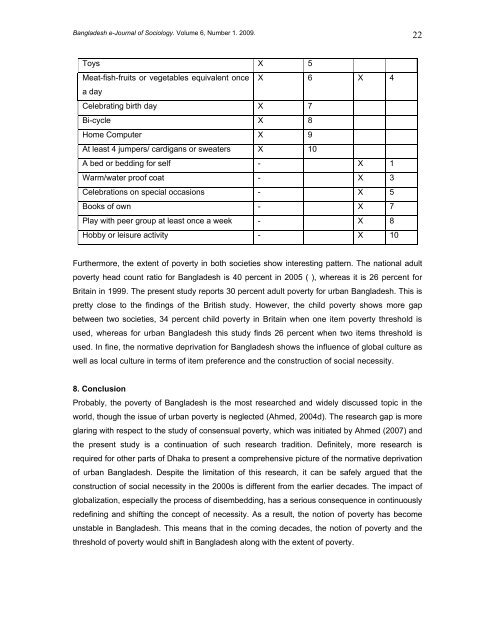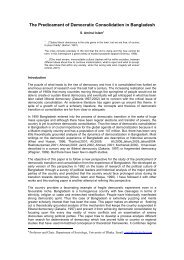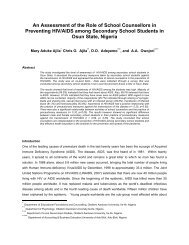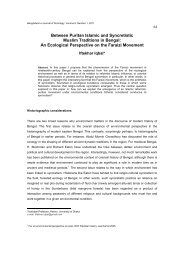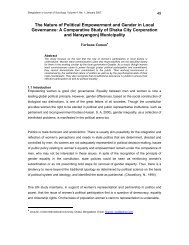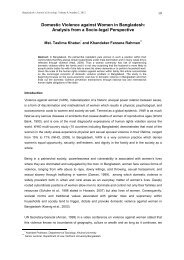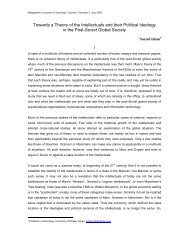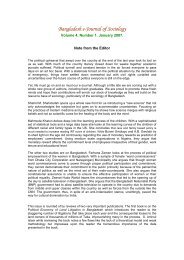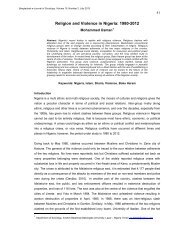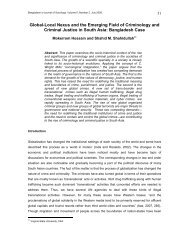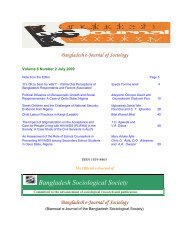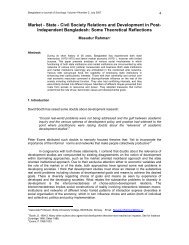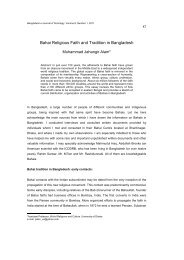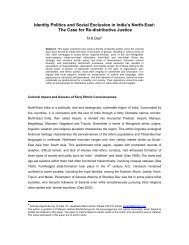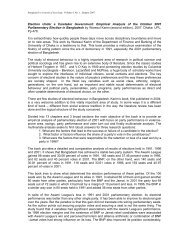Bangladesh e-Journal of Sociology - Bangladeshsociology.org
Bangladesh e-Journal of Sociology - Bangladeshsociology.org
Bangladesh e-Journal of Sociology - Bangladeshsociology.org
Create successful ePaper yourself
Turn your PDF publications into a flip-book with our unique Google optimized e-Paper software.
<strong>Bangladesh</strong> e-<strong>Journal</strong> <strong>of</strong> <strong>Sociology</strong>. Volume 6, Number 1. 2009.<br />
22<br />
Toys X 5<br />
Meat-fish-fruits or vegetables equivalent once X 6 X 4<br />
a day<br />
Celebrating birth day X 7<br />
Bi-cycle X 8<br />
Home Computer X 9<br />
At least 4 jumpers/ cardigans or sweaters X 10<br />
A bed or bedding for self - X 1<br />
Warm/water pro<strong>of</strong> coat - X 3<br />
Celebrations on special occasions - X 5<br />
Books <strong>of</strong> own - X 7<br />
Play with peer group at least once a week - X 8<br />
Hobby or leisure activity - X 10<br />
Furthermore, the extent <strong>of</strong> poverty in both societies show interesting pattern. The national adult<br />
poverty head count ratio for <strong>Bangladesh</strong> is 40 percent in 2005 ( ), whereas it is 26 percent for<br />
Britain in 1999. The present study reports 30 percent adult poverty for urban <strong>Bangladesh</strong>. This is<br />
pretty close to the findings <strong>of</strong> the British study. However, the child poverty shows more gap<br />
between two societies, 34 percent child poverty in Britain when one item poverty threshold is<br />
used, whereas for urban <strong>Bangladesh</strong> this study finds 26 percent when two items threshold is<br />
used. In fine, the normative deprivation for <strong>Bangladesh</strong> shows the influence <strong>of</strong> global culture as<br />
well as local culture in terms <strong>of</strong> item preference and the construction <strong>of</strong> social necessity.<br />
8. Conclusion<br />
Probably, the poverty <strong>of</strong> <strong>Bangladesh</strong> is the most researched and widely discussed topic in the<br />
world, though the issue <strong>of</strong> urban poverty is neglected (Ahmed, 2004d). The research gap is more<br />
glaring with respect to the study <strong>of</strong> consensual poverty, which was initiated by Ahmed (2007) and<br />
the present study is a continuation <strong>of</strong> such research tradition. Definitely, more research is<br />
required for other parts <strong>of</strong> Dhaka to present a comprehensive picture <strong>of</strong> the normative deprivation<br />
<strong>of</strong> urban <strong>Bangladesh</strong>. Despite the limitation <strong>of</strong> this research, it can be safely argued that the<br />
construction <strong>of</strong> social necessity in the 2000s is different from the earlier decades. The impact <strong>of</strong><br />
globalization, especially the process <strong>of</strong> disembedding, has a serious consequence in continuously<br />
redefining and shifting the concept <strong>of</strong> necessity. As a result, the notion <strong>of</strong> poverty has become<br />
unstable in <strong>Bangladesh</strong>. This means that in the coming decades, the notion <strong>of</strong> poverty and the<br />
threshold <strong>of</strong> poverty would shift in <strong>Bangladesh</strong> along with the extent <strong>of</strong> poverty.


